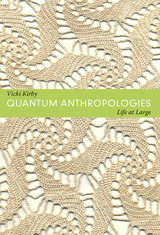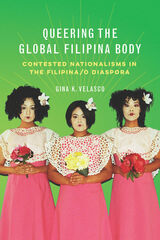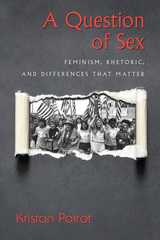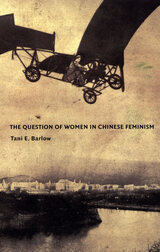178 books about Feminist theory and 4
start with Q
178 books about Feminist theory and 4
178 books about Feminist theory
4 start with Q start with Q
4 start with Q start with Q

Quantum Anthropologies
Life at Large
Vicki Kirby
Duke University Press, 2011
In Quantum Anthropologies, the renowned feminist theorist Vicki Kirby contends that some of the most provocative aspects of deconstruction have yet to be explored. Deconstruction’s implications have been curtailed by the assumption that issues of textuality and representation are specific to the domain of culture. Revisiting Derrida’s claim that there is “no outside of text,” Kirby argues that theories of cultural construction developed since the linguistic turn have inadvertently reproduced the very binaries they intended to question, such as those between nature and culture, matter and ideation, and fact and value. Through new readings of Derrida, Husserl, Saussure, Butler, Irigaray, and Merleau-Ponty, Kirby exposes the limitations of theories that regard culture as a second-order system that cannot access—much less be—nature, body, and materiality. She suggests ways of reconceiving language and culture to enable a more materially implicated outcome, one that keeps alive the more counterintuitive and challenging aspects of poststructural criticism. By demonstrating how fields, including cybernetics, biology, forensics, mathematics, and physics, can be conceptualized in deconstructive terms, Kirby fundamentally rethinks deconstruction and its relevance to nature, embodiment, materialism, and science.
[more]

Queering the Global Filipina Body
Contested Nationalisms in the Filipina/o Diaspora
Gina K. Velasco
University of Illinois Press, 2020
Contemporary popular culture stereotypes Filipina women as sex workers, domestic laborers, mail order brides, and caregivers. These figures embody the gendered and sexual politics of representing the Philippine nation in the Filipina/o diaspora. Gina K. Velasco explores the tensions within Filipina/o American cultural production between feminist and queer critiques of the nation and popular nationalism as a form of resistance to neoimperialism and globalization.
Using a queer diasporic analysis, Velasco examines the politics of nationalism within Filipina/o American cultural production to consider an essential question: can a queer and feminist imagining of the diaspora reconcile with gendered tropes of the Philippine nation? Integrating a transnational feminist analysis of globalized gendered labor with a consideration of queer cultural politics, Velasco envisions forms of feminist and queer diasporic belonging, while simultaneously foregrounding nationalist movements as vital instruments of struggle.
Using a queer diasporic analysis, Velasco examines the politics of nationalism within Filipina/o American cultural production to consider an essential question: can a queer and feminist imagining of the diaspora reconcile with gendered tropes of the Philippine nation? Integrating a transnational feminist analysis of globalized gendered labor with a consideration of queer cultural politics, Velasco envisions forms of feminist and queer diasporic belonging, while simultaneously foregrounding nationalist movements as vital instruments of struggle.
[more]

A Question of Sex
Feminism, Rhetoric, and Differences That Matter
Kristan Poirot
University of Massachusetts Press, 2014
By the mid-1990s feminist theorists and critics began to challenge conventional thinking about sex difference and its relationship to gender and sexuality. Scholars such as Anne Fausto-Sterling and Judith Butler troubled the sex-gender/nature-nurture divide. Some have asserted that these questions about sex are much too abstract to contribute to a valuable understanding of the material politics faced by feminist movements. In A Question of Sex, Kristan Poirot challenges this assumption and demonstrates that contemporary theories about sex, gender, identity, and difference compel a rethinking of the history of feminist movements and their rhetorical practices.
Poirot focuses on five case studies—the circulation of Sojourner Truth's "Ain't I a Woman?" in early and contemporary feminist contexts; the visual rhetorics of the feminist self-help health movement; the public discourse of Elizabeth Cady Stanton and early nineteenth-century ideas about suffrage, sex, and race; the conflicts over lesbian sexuality in the 1960s and 1970s; and the discourse that surrounds twenty-first-century SlutWalks. In the process, Poirot rethinks the terms through which we understand U.S. feminist movements to explore the ways feminism has questioned sexed distinctions and practices over time. She emphasizes the importance of reading feminist engagements with sex as rhetorical endeavors—practices that are shaped by the instrumental demands of movements, the exigent situations that call for feminists to respond, and the enduring philosophical traditions that circulate in U.S. political contexts., reviewing a previous edition or volume
Poirot focuses on five case studies—the circulation of Sojourner Truth's "Ain't I a Woman?" in early and contemporary feminist contexts; the visual rhetorics of the feminist self-help health movement; the public discourse of Elizabeth Cady Stanton and early nineteenth-century ideas about suffrage, sex, and race; the conflicts over lesbian sexuality in the 1960s and 1970s; and the discourse that surrounds twenty-first-century SlutWalks. In the process, Poirot rethinks the terms through which we understand U.S. feminist movements to explore the ways feminism has questioned sexed distinctions and practices over time. She emphasizes the importance of reading feminist engagements with sex as rhetorical endeavors—practices that are shaped by the instrumental demands of movements, the exigent situations that call for feminists to respond, and the enduring philosophical traditions that circulate in U.S. political contexts., reviewing a previous edition or volume
[more]

The Question of Women in Chinese Feminism
Tani E. Barlow
Duke University Press, 2004
The Question of Women in Chinese Feminism is a history of thinking about the subject of women in twentieth-century China. Tani E. Barlow illustrates the theories and conceptual categories that Enlightenment Chinese intellectuals have developed to describe the collectivity of women. Demonstrating how generations of these theorists have engaged with international debates over eugenics, gender, sexuality, and the psyche, Barlow argues that as an Enlightenment project, feminist debate in China is at once Chinese and international. She reads social theory, psychoanalytic thought, literary criticism, ethics, and revolutionary political ideologies to illustrate the range and scope of Chinese feminist theory’s preoccupation with the problem of gender inequality. She reveals how, throughout the cataclysms of colonial modernity, revolutionary modernization, and market socialism, prominent Chinese feminists have gathered up the remainders of the past and formed them into social and ethical arguments, categories, and political positions, ceaselessly reshaping progressive Enlightenment sexual liberation theory.
[more]
READERS
Browse our collection.
PUBLISHERS
See BiblioVault's publisher services.
STUDENT SERVICES
Files for college accessibility offices.
UChicago Accessibility Resources
home | accessibility | search | about | contact us
BiblioVault ® 2001 - 2024
The University of Chicago Press









